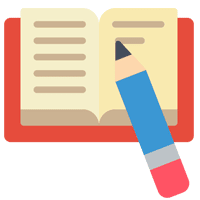Reflective Journaling
Definition
Feltham and Dryden (1993, p. 100) define ‘journal keeping’ as ‘the recording of observations of personal and professional growth by the trainee counsellor’.
Keeping a reflective journal is often strongly encouraged – and perhaps even required – by providers of counselling training. The Australian College of Applied Psychology (ACAP, n.d.) defines a reflective journal as ‘a steadily growing document that you write to record the progress of your learning’. It continues: ‘This type of journal is not simply a summary of the course material; it should also include your reactions to what you've learnt.’

Many qualified practitioners choose to continue journaling for their own processing and reflection.
Journaling versus Reflective Journaling
Many people also choose to start a journal in the new year, as part of their determination to improve their health and wellbeing. But there’s a difference between journaling and reflective journaling.
LeGuillox (2017) writes: ‘Being reflective is the process of using metacognition, which refers to taking the time to think on a deeper level about one’s own thinking, in order to acquire a different perspective of these thoughts that may have been overlooked at first.’
Thus, while journaling may describe experiences, reflective journaling ‘allows an individual to more carefully consider the profound experiences that have impacted on their lives, or become critically aware of how these experiences have shaped them in some way’ (LeGuillox, 2017).
Benefits of Reflective Journaling
Positive outcomes of reflective journaling may include:
- increased awareness of the real self and its thoughts, fears, desires and values
- ability to apply this new understanding in future situations
- possibility of living more fully through acting in line with the real self.
Media to Use
Written journals
A journal traditionally takes the form of a paper notebook – perhaps a lovely-looking one, chosen for its feel, colour and/or cover image. You would then handwrite your reflections into the notebook. A notebook is often better than a diary, as the latter has only a limited amount of space per day, and may make you feel you should write entries when you have nothing of note to add.
An alternative is to use an electronic medium, such as word-processing software on a computer/tablet, or a notes facility on a tablet/smartphone. You can also get journal-writing apps.
Spoken journals

It is also possible to audio-record your reflections, perhaps using your smartphone or a voice recorder.
Students of counselling and psychotherapy on practitioner-level courses need to have equipment to record practice skills sessions, and so could use this.
Writing Style
For many people who have had bad experiences at school in the past – perhaps those who are dyslexic, were taught by teachers who lacked empathy, and/or were in education at a time when there was poor understanding of specific learning difficulties and other barriers to learning – writing can seem a daunting task. You might feel worried about making spelling mistakes and not knowing how to get punctuation and grammar right.
While these considerations matter (though only to a limited extent) when writing assignments, they don’t matter at all when writing a journal.
Your journal is just for you: you are the only reader. So feel free to use bullet points, jot down short notes and spell things however you like. Just make sure though that you can read your own writing, as you might want to look back on your journal when gathering material for assignments on personal development and self-awareness.
The main thing – above all else – is to be honest!
Timing and Frequency of Writing
It’s good to record ideas in your journal as soon as you can after the experience that triggers them – otherwise, it can be easy to forget those ‘lightbulb’, ‘Eureka’ moments! If you don’t have your journal ready at hand to do so, you could write a short reminder note (or record an audio clip) to add to it later.
Unlike keeping a formal diary, there’s no need to write at any particular frequency – though it’s good to try to do so reasonably often, so that it becomes a habit, and so that the journal captures the changes you are experiencing.
Students of counselling and psychotherapy often like to write an entry after each time they have had a college learning session, perhaps with the date or topic of the session as a heading.
Most importantly, do make sure you have a quiet and private space in which to write.
It’s good to record ideas in your journal as soon as you can after the experience that triggers them – otherwise, it can be easy to forget those ‘lightbulb’, ‘Eureka’ moments! If you don’t have your journal ready at hand to do so, you could write a short reminder note (or record an audio clip) to add to it later.
Steps in Journal Writing
LeGuillox (2017) proposes a four-stage process to reflective journaling:
- Brainstorm ideas.
- Reflect on your current emotional and physical state.
- Start asking yourself critical and profound questions.
- Reflect on your journal entries and check in with emotions.
Free Handout Download
Reflective Journalling - Free Handout for Counsellors
Learning Experiences
If you are a student of counselling and psychotherapy, you may well be expected to focus in your reflective journal on your experiences in college. Indeed, ACAP (n.d.) points out that another word for a reflective journal is a learning journal.
Your college will guide you on how they wish you to approach writing a reflective journal.
ACAP (n.d.) offers the following as learning-related ideas for content:
- What did I read for this topic?
- What was the most interesting thing I read for this topic, and why?
- What material did I not find interesting, and why?
- What did I previously think was true, but now know to be wrong?
- What did we not cover that I expected we should?
- What have I changed my mind about as a result of this topic?
- What is one thing I learned in this topic that I may be able to use in future?
- What am I still unsure about?
- What would I like to learn more about?
- What issues(s) interested me and would I like to study in more detail?
- What are my ideas for action, based on this topic?
A Final Health Warning
It can be a very challenging process to reflect on difficult experiences, potentially uncovering unpleasant emotions and realisations. This may be especially so if you have a history of trauma.
It would be sensible to ensure you have good support around you before delving into difficult experiences, perhaps through personal counselling. It’s also good to leave yourself time after writing to process any emotions that have arisen for you during journaling, rather than having to rush back into everyday life.
References
ACAP. (n.d.). Reflective or learning journal. ACAP. [Viewed 26/11/21]. Available from: https://sls.navitas-professional.edu.au/sites/default/files/resource/reflective_or_learning_journal.pdf
Feltham, C. and Dryden, W. (1993). Dictionary of Counselling. London: Whurr.
LeGuillox, H. (2017). Reflective Journaling: A Step-by-Step Guide [online]. Counsellors Café Magazine. [Viewed 26/11/21]. Available from: https://www.thecounsellorscafe.co.uk/single-post/2017/01/22/reflective-journaling-a-step-by-step-guide
Resource created: 26 November 2021